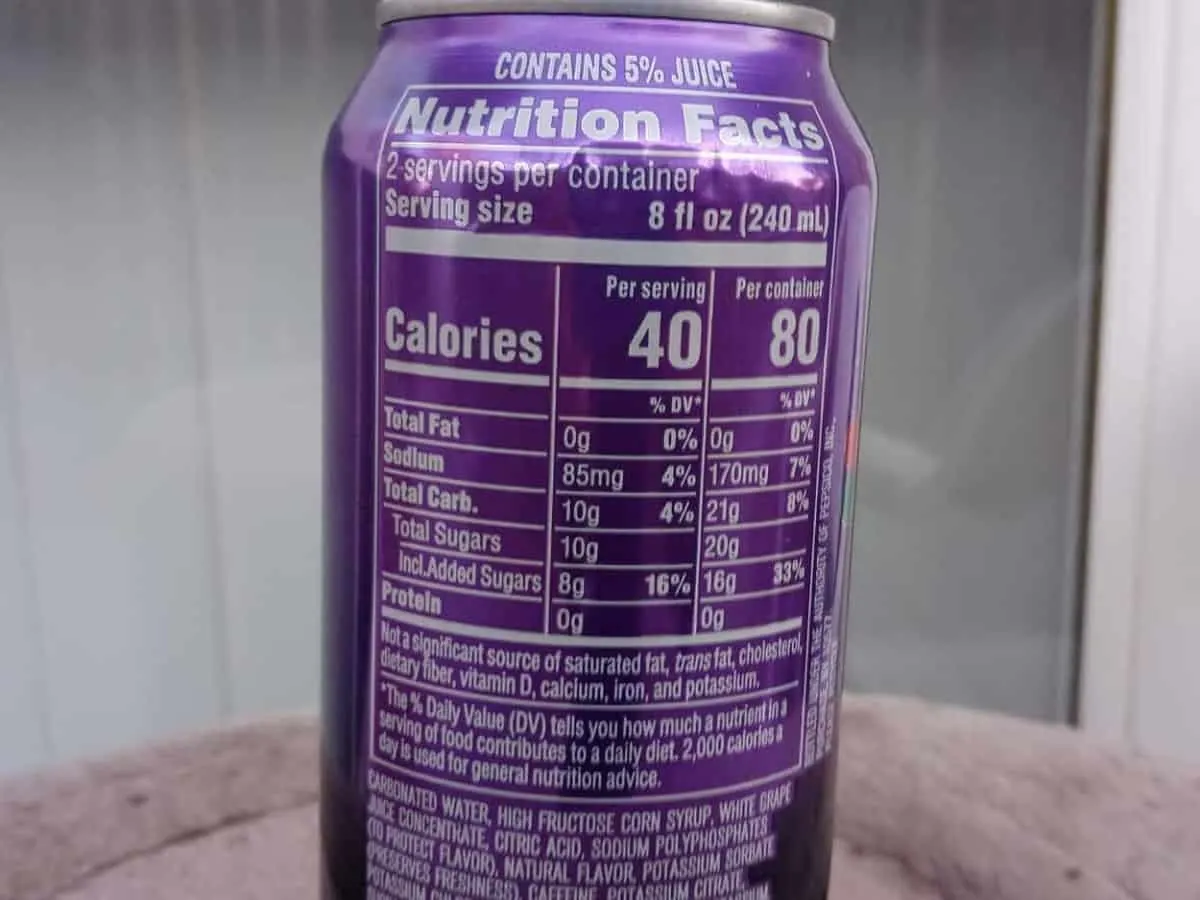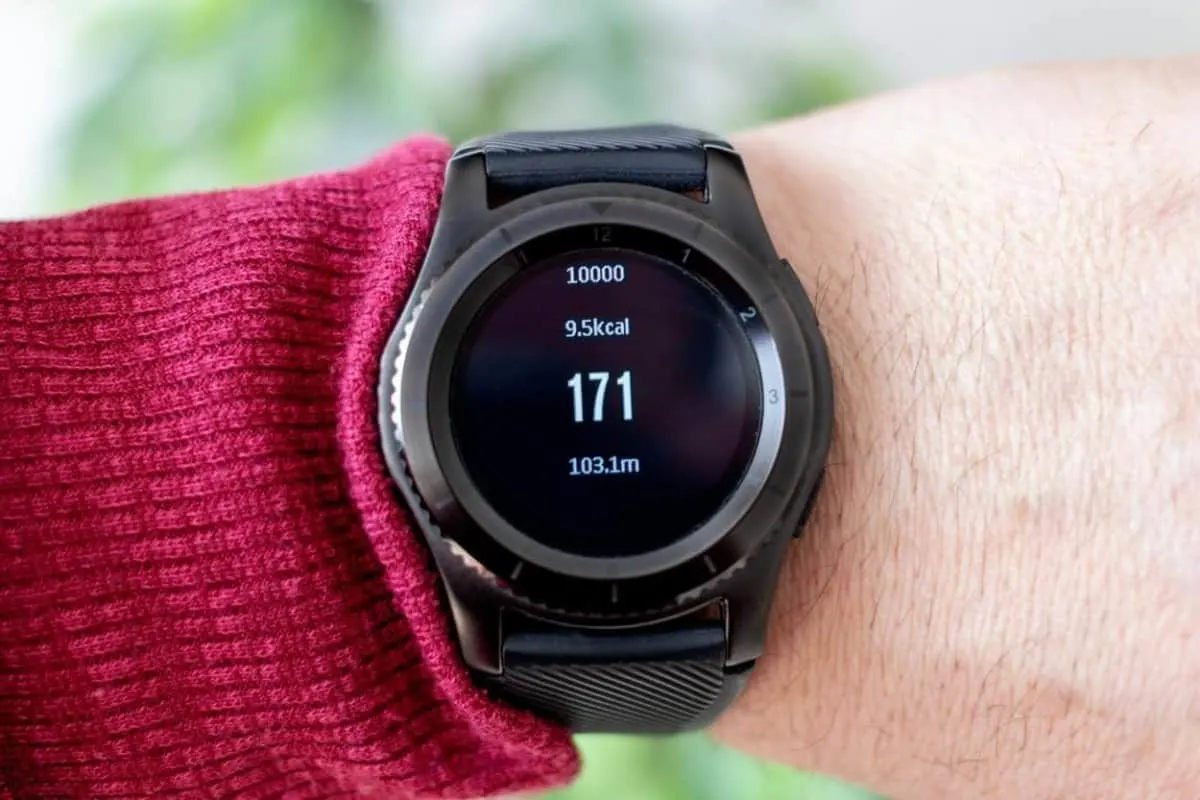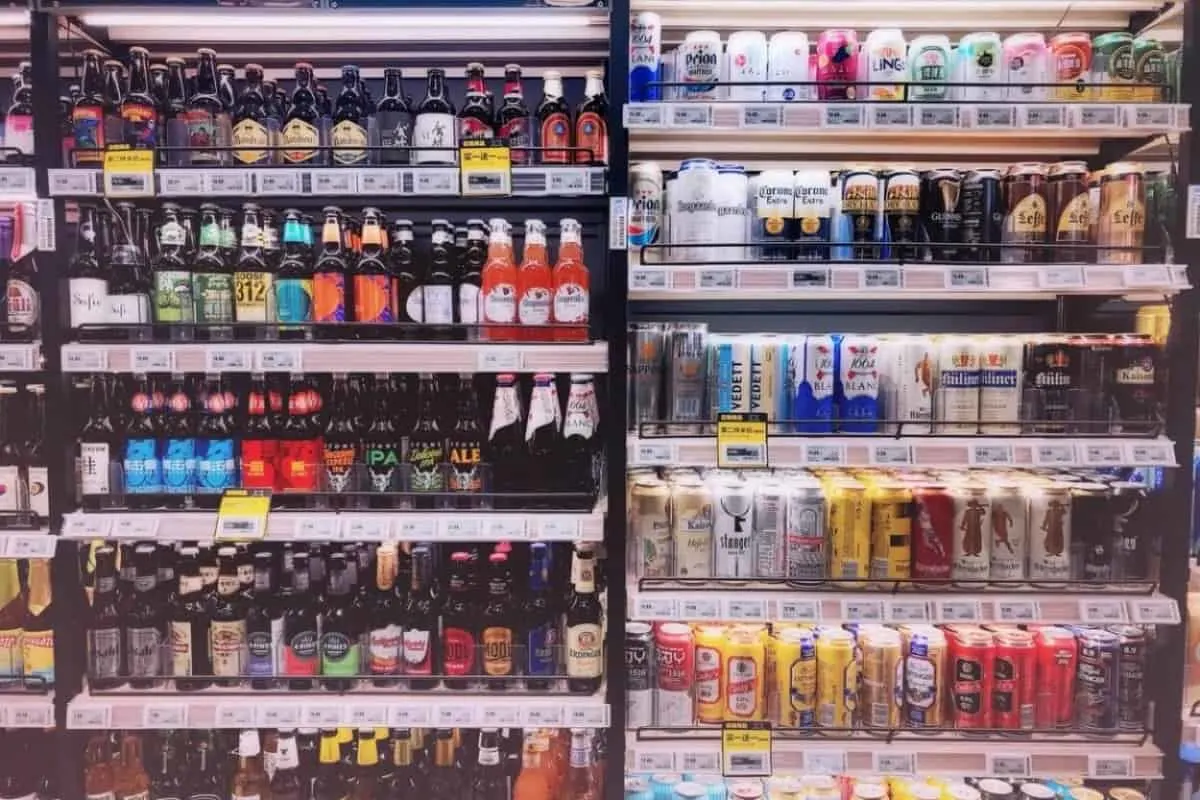Mountain Dew Kickstart isn’t bad for you as long as you drink it in moderation.
Mountain Dew Kickstart is a unique beverage with a refreshing taste similar to the hit soda brand Mountain Dew.
However, just because it tastes good doesn’t mean it won’t be bad for you.
Mountain Dew Kickstart is a combination of juice, caffeine, and dew. So it’s definitely more than your average drink.
Read on to learn more about Mountain Dew Kickstart and whether it’s good for you or not.
Page Contents
Mountain Dew Kickstart Nutrition Facts

To answer the main question, we’ll start looking at the nutrition facts of Mountain Dew Kickstart.
Let’s take a quick look at the nutritional info of Mountain Dew Kickstart.
| Nutrients | Amount |
| Fat | 0 g |
| Protein | 0 g |
| Energy | 80 calories |
| Sugar | 20 g |
| Carbohydrate | 21 g |
| Caffeine | 90 mg |
| Sodium | 170 g |
As you can see, Mountain Dew Kickstart is protein and fat-free, but it contains 80 calories, 20 grams of sugar, and 90 mg of caffeine.
What is the Calorie Content of Mountain Dew Kickstart?

Mountain Dew Kickstart has 80 calories per 16 fl. oz. can, which is typical for a caffeinated beverage.
Compared to other brands like Red Bull and Monster, Mountain Dew Kickstart has fewer calories for its size. Red Bull and Monster contain 110 calories and 210 calories, respectively, for every 16 fl. oz.
Considering the daily recommended calorie intake which is 2,000 to 2,500 calories (depending on lifestyle and other factors), a single can of Mountain Dew Kickstart would hardly make a difference in your overall diet.
However, having several cans of Mountain Dew Kickstart isn’t a good idea because the calories can add up over time.
Also, it’s good to remember that Mountain Dew Kickstart does not provide you with all of the essential nutrients you need, so instead of trying to substitute your overall calorie need with this drink, you should eat proper meals.
Now let’s move on and discuss the sugar content of Mountain Dew Kickstart.
How Much Sugar is in Mountain Dew Kickstart?
Mountain Dew Kickstart contains 20 g of sugar per 16 fl. oz. can. Although this is pretty high, it is still within the healthy daily limit of sugar consumption.
Mountain Dew Kickstart has a significant sugar level for a 16 fl. oz. serving.
The American Heart Association recommend the following sugar intake:
- 25 g of sugar for women per day
- 36 g of sugar for men per day
Based on these figures, the sugar content of Mountain Dew Kickstart is pretty close to the recommended limit and that means you can’t consume more than one can a day.
To know exactly how many Mountain Dew Kickstarts you can drink in a day, check this article that I have written.
Exceeding the recommended sugar intake limit can pose many health risks related to high sugar levels in the body.
In addition to that, Mountain Dew Kickstart substitutes high fructose corn syrup (HFCS) for table sugar. This kind of sugar is derived from corn syrup and is commonly used to improve the taste of processed foods.
Though it is also a sweetener, HFCS is thought to be more unhealthy than table sugar and may cause serious health problems such as insulin resistance and hypertension when consumed excessively.
In particular, high sugar consumption can cause a variety of health problems like:
- high blood pressure
- acne
- weight gain
- diabetes
- cardiovascular disease
- dental problems
So, make sure to consume responsibly and limit your intake of Mountain Dew Kickstart to prevent the adverse effects of too much sugar in the body.
Now let’s move on to caffeine!
How Much Caffeine is in Mountain Dew Kickstart?
Mountain Dew Kickstart contains 90 mg of caffeine per 16 fl. oz. can, which is within the recommended level and poses little risk of caffeine overdose.
The caffeine content of Mountain Kickstart is pretty low compared to Reign and 3D Energy.
This might be good news for those sensitive to caffeine because the low caffeine levels of this drink will reduce your risk of caffeine overdose.
While caffeine overdose is rare, it is still harmful to your health and might lead to various health problems in the future.
To prevent cases of caffeine overdose, the Food and Drug Administration recommends a daily caffeine intake of 400 mg for healthy adults.
If you go past this limit, it is highly possibly you might suffer the following side effects:
- anxiety
- headaches
- dehydration
- dizziness
- restlessness
- shakiness
- irritability
- fever
Based on the FDA’s recommended caffeine limit, you can consume up to 4 cans of Mountain Dew Kickstart before you exceed it, BUT, as pointed out earlier, the sugar level shows you cannot consume more than one can.
Overall, the moderate caffeine in Mountain Dew Kickstart makes it an ideal drink for people with low caffeine tolerance.
The 90 mg of caffeine could be enough for you to feel stimulated without experiencing the side effects of caffeine overdose.
Now that we’re done inspecting its nutrition facts, let’s proceed with its ingredients list.
Mountain Dew Kickstart Ingredients
Here are the ingredients used in Mountain Dew Kickstart:
- High Fructose Corn Syrup
- Carbonated Water
- Citric Acid
- Natural Flavor
- Caffeine
- Sodium Polyphosphate
- Potassium Chloride
- Potassium Citrate
- Sucralose
- Gum Arabic
- Calcium Disodium EDTA
- Acesulfame Potassium
- Sucrose Acetate Isobutyrate
- Salt
- Blue Coloring
Potassium chloride, gum arabic, and calcium disodium are commonly used in beverages to preserve their freshness and flavor. And all of these are not that bad for you as long as you consume Mountain Dew Kickstart in moderation.
Does Mountain Dew Kickstart Have Artificial Sweeteners?
Mountain Dew Kickstart contains artificial sweeteners such as acesulfame potassium and sucralose.
Artificial sweeteners are used to enhance the taste of food and beverages without adding calories or sugar.
They’re usually really sweet and have little to no calories, so they’re an excellent choice if you’re trying to lose weight.
These sweeteners are a common ingredient in zero-calorie drinks because they give no additional calories, perfect for those closely monitoring their calorie intake.
You should also be aware of the side effects of artificial sweeteners. Rest assured, you should be fine as long as you limit your intake of anything that contains artificial sweeteners.
Is Mountain Dew Kickstart Better than Energy Drinks?

Mountain Dew Kickstart, in my opinion, isn’t any better than most energy drinks.
The calorie, caffeine, and sugar content of Mountain Dew Kickstart are fairly moderate. Having a can of this every now and then isn’t going to put your health at risk.
In terms of caffeine, Mountain Dew Kickstart has a low caffeine content, so I don’t think this would be the best drink for long high-intensity tasks.
I also don’t think that Mountain Dew Kickstart is comparable to other energy drink brands because according to Pepsi.co, its manufacturers, it is not an energy drink but a caffeinated soda.
Can a 13-year-old drink kickstart?
The general consensus is that 13-year-olds shouldn’t drink Mountain Dew Kickstart or any other caffeinated drinks like energy drinks. Given their high caffeine content and potential health risks, the American Academy of Pediatrics advises against giving children and teenagers energy drinks.
Caffeine can have a stronger impact on younger individuals, as their bodies may be more sensitive to its effects. Consuming excessive amounts of caffeine can disrupt sleep patterns, negatively affect attention and behavior, and potentially lead to other health issues.
Is Kickstart safe to drink?
Mountain Dew Kickstart, when consumed in moderation, can be considered safe for most individuals. However, it is important to be mindful of the high sugar content in Kickstart, which can contribute to weight gain, tooth decay, and other health issues associated with excessive sugar consumption.
Additionally, the caffeine content in Kickstart can have varying effects on individuals, and some people may be more sensitive to its stimulant properties. It is crucial to be aware of your own caffeine sensitivity and to avoid excessive consumption, as it can lead to adverse effects.
What damage can Mountain Dew Kickstart do to your body?
Mountain Dew Kickstart can cause multiple damages to your body. Like most energy drinks, Mountain Dew Kickstart contains caffeine and other active ingredients that can have negative effects on your health when consumed in excessive and large amounts in one go.
Some of the potential effects of consuming too much Mountain Dew Kickstart or other energy drinks can include increased heart rate and blood pressure, insomnia or difficulty sleeping, jitteriness or nervousness m stomach problems such as nausea, cramping, or diarrhea
Is Mountain Dew Kickstart bad for your kidneys?
Mountain Dew Kickstart is bad for your kidneys. Consuming high amounts of caffeine and other active ingredients in Mountain Dew Kickstart can potentially lead to negative effects on your kidneys. Caffeine is a stimulant that can cause increased urine production and lead to dehydration, which can cause kidney damage.
In addition, the high sugar and artificial sweetener content in Mountain Dew Kickstart and other energy drinks can contribute to the development of other health problems, such as obesity and type 2 diabetes, which can increase the risk of kidney damage over time.
Is Mountain Dew Kickstart Bad for You?
Mountain Dew Kickstart isn’t bad for you if you’re an average healthy person without existing conditions and you limit your consumption of this drink.
Mountain Dew Kickstart, like all caffeine-containing drinks, becomes harmful if you consume more than you can manage, especially if you have a low caffeine tolerance.
Although Mountain Dew Kickstart is not bad for you, keep in mind that it is not recommended if you’re under the age of 18, if you’re breastfeeding, or if you have medical problems that may be affected by sugar or caffeine intake.
All of the ingredients and nutrients in Mountain Dew Kickstart are safe to consume, so it won’t pose any outright danger to your health.
Just remember to limit your consumption to remain within the suggested limits of these nutrients.
Learn more about Mountain Dew Kickstart by watching the video below.
How much is Mountain Dew Kickstart?
A 12-pack of 16 fl. oz Mountain Dew Kickstart costs about $26 in Amazon.
Given that its simply a caffeinated soda, I believe the price of Mountain Dew Kickstart is quite high. There are some energy drinks with additional nutrients supplements sold at the same price.
If you’re really keen on trying Mountain Dew Kickstart, I suggest buying the flavors that are infused with vitamins like the Orange Citrus flavor. This might be a more beneficial option and you’ll get more for your money’s worth.
Overall, Mountain Dew Kickstart is a decent drink if you don’t mind spending a little extra money.
Mountain Dew Kickstart is available at local retail stores such as Walmart and Target. You can also find some great deals at Amazon and eBay.
Mountain Dew Kickstart Flavors
Mountain Dew Kickstart is available in nine different flavors, each with its own set of ingredients, such as additional B-Vitamins.
These are the Mountain Dew Kickstart flavors:
- Raspberry Citrus
- Original Dew
- Black Cherry
- Mango Lime
- Orange Citrus
- Fruit Punch
- Midnight Grape
- Blueberry Pomegranate
- Pineapple Orange Mango
Final Word
Mountain Dew Kickstart isn’t harmful to your health if consumed responsibly and at healthy intervals.
What you really need to watch out for is its sugar level.
However, if you drink this caffeinated beverage minimally and track your daily sugar consumption, it should be okay. Of course, it’s not advisable to drink Mountain Dew Kickstart every single day.
But if you keep your intake to at least every other day, you can enjoy this delicious beverage without worrying about the repercussions on your health.
If you’re caffeine-sensitive, the caffeine content is also something you should track. Although it only contains minimal traces of caffeine, if your body responds to it negatively, you might need to adjust your consumption.
I suggest one can every other day, just to be safe.
Now that you’re equipped with the knowledge of what makes Mountain Dew Kickstart healthy and what doesn’t, you can drink it without worry.
